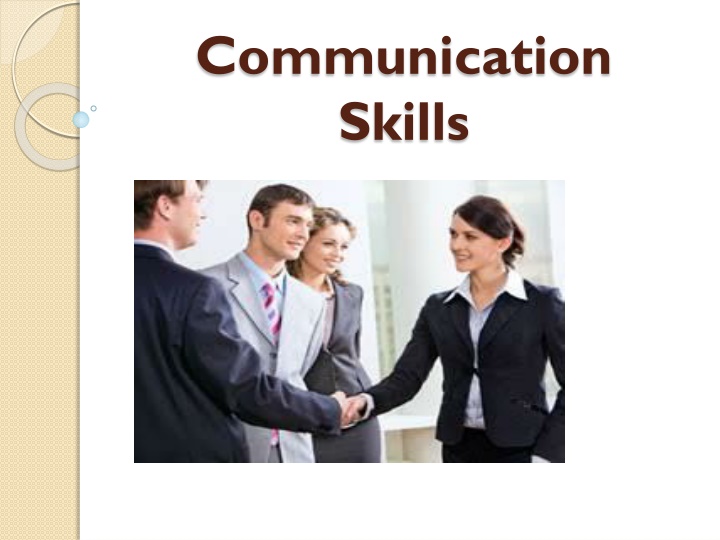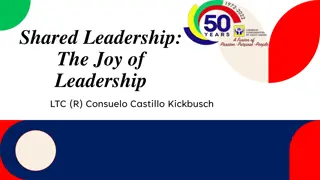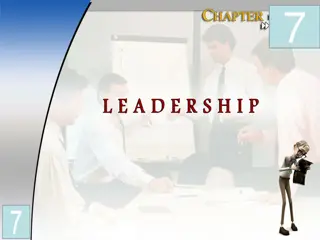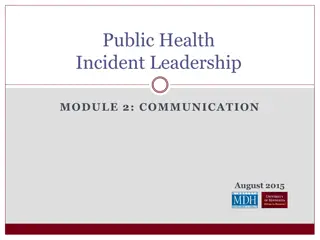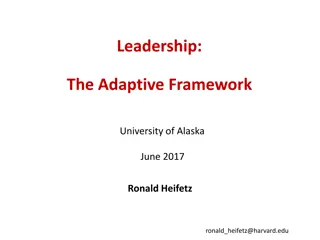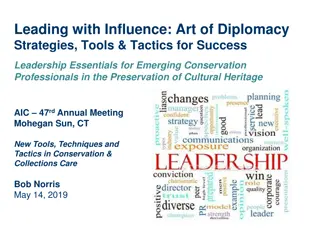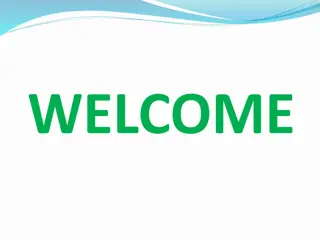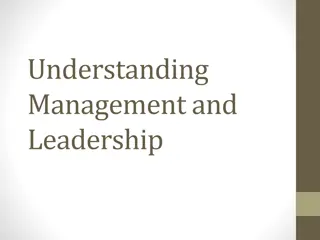The Importance of Effective Communication in Leadership
Effective communication is essential for successful leadership. It involves listening actively, understanding others' feelings and thoughts, and using words as tools to connect and influence. Communication can be formal or informal, verbal or non-verbal, and takes place through various channels like face-to-face interaction, telephone calls, emails, and body language. To communicate effectively, one must be courteous, concise, concrete, considerate, complete, clear, and correct. Enhancing communication skills can lead to personal and career success.
Download Presentation

Please find below an Image/Link to download the presentation.
The content on the website is provided AS IS for your information and personal use only. It may not be sold, licensed, or shared on other websites without obtaining consent from the author.If you encounter any issues during the download, it is possible that the publisher has removed the file from their server.
You are allowed to download the files provided on this website for personal or commercial use, subject to the condition that they are used lawfully. All files are the property of their respective owners.
The content on the website is provided AS IS for your information and personal use only. It may not be sold, licensed, or shared on other websites without obtaining consent from the author.
E N D
Presentation Transcript
Communication Skills
Some Quotes on Communication "The art of communication is the language of leadership." "To listen well is as powerful a means of communication and influence as to talk well." "We have two ears and one mouth so that we can listen twice as much as we speak." Communication - the human connection - is the key to personal and career success. Words should be used as tools of communication and not as a substitute for action.
Why is communication important? Important behavior,our feelings and thoughts. for expressing information, Helps to understand and respond to other s feelings, thoughts, knowledge and behavior.
What is Effective Communication?
TYPES OF COMMUNICATION VERBAL FACE TO FACE TELEPHONE BODY LANGUAGE GESTURES BOOKS EMAILS GRAPHSAND CHARTS MAPS NON VERBAL WRITTEN VISUALIZATION
Formal Communication It information by following the prescribed or official rules. is the process of exchanging
Informal Communication It is the process of spontaneous exchange of information among various people of different status.
TOTAL COMMUNICATION PROCESS 16 Reading Writing Speaking Listening 9 45 30
The 7 C of Communication Courteous Concise Concrete Consideration Complete Clear Correct
Potential influences Body Language/ Non- Verbal Communication Language used Existing knowledge Assumptions Context Memory Attitudes Stress Clarity Culture Listening skills Writing skills
The Communication Process Medium Barrier SENDER (encodes) RECEIVER (decodes) Barrier Feedback/Response
Barriers to Effective Communication Language Time Noise Other people Distractions Barriers to effective communication Put downs Too many questions Lack of interest Distance Discomfort with the topic Disability
Over coming the barriers of Effective Communication Skills Eye contact & visible mouth Body language Some questions Effective Encouragement to continue Silenc e Communication skills Smiling face Summarising what has been said Checking for understanding
Open-ended and closed-ended questions get different results and feel different to providers How it feels to providers Open-ended questions You care about their opinions and feelings You care about what they think is important Expand the dialogue They invite the other person to tell you more How it feels to providers Closed-ended questions End the dialogue Only get you the specific answer you re asking for (at best!) You see them only as a source of information You are judging them (answer is right or wrong) 4
Tips for Asking Open Questions? How do you ..? What has been your experience with ? What is your opinion about .? How do you feel about .? When do you ? Describe .. Tell me about . For which type of clients do you ? What would happen if ? 19
An Introduction To Public Speaking
What skills are required for Public Speaking? 1. Planning & Preparation Before you can start to plan and prepare the message and the structure for your Public Speaking activity you will need to consider the Purpose Audience Timings
2. Positive Non-Verbal Communications Public Speaking isn t just about what you say; It s also about how you say it! Your Posture & Body Movements Your Facial Movements & Making Regular Eye Contact Your Voice Pitch & Tone
Positive Examples Of Non-Verbal Communication Negative Examples Of Non-Verbal Communication Head Looking Up Head Looking Down A Smile A Frown Small Hand & Arm Gestures Exaggerated Hand & Arm Gestures Folded Arms Free Arms Wondering About The Stage Keeping To One Area Of The Stage Only Focusing Your Eye Contact On One Or Two Members Of The Audience Making Eye Contact With Various Members Of The Audience
3. CONFIDENCE For building confidence, one must avoid the following:- Hesitation - Apause longer than three seconds. Repitation - Using the same words or phrases repeatedly (excluding the phrase of the topic) Deviation - Going completely off the given topic.
How to communicate with People:- Director Socializer Be clear, brief, fast, and precise. Be well-prepared to provide solutions to their problems. Skip the small talk and get down to business. Highlight key points. Avoid going into too much detail. Find out their goals and provide options with clear costs and benefits. Supply concrete data to back up claims of progress. Show how goals have been obtained. Take time to build a relationship and socialize with them. Create a fun, lively atmosphere with new and diverse elements. Help them make a list of priorities, but try to skip the unimportant details and boring material. After a meeting, be clear about who is going to do what and by when. Put everything down in writing. Make them look good in front of others. Be slow to criticize them. Instead, motivate them with praise.
How to communicate with People:- Analyser Relator Avoid too much small talk and socializing. Go slow and give them time and space to think things through. Be well-prepared to answer their questions thoroughly with precise data. Put everything down in writing. Make good on your promises. Be patient and show sincere interest in them as a person. Build a relationship and learn more about their personal lives before getting down to business. Reduce their fears by clearly explaining how a certain change will benefit them and those around them. Be predictable and follow through with your stated promises. Be warm and inviting. Focus on their feelings. Don't ever push them into a corner to get what you need.
ROLE OF SOCIAL MEDIA IN COMMUNICATION
If you are not on Facebook, you don t exist! (?) TRUE FALSE
Example of social media segmentation
TYPES OF PERSONS IN COMUNICATION
QUIET QUIZ 1. I prefer one-on-one conversations to group activities? 2. I often prefer to express myself in writing? 3. I enjoy solitude? 4. I seem to care about wealth, fame, and status less than my peers? 5. People tell me that I'm a good listener? 6. I'm not a big risk-taker?
7. I enjoy work that allows me to "dive in" with few interruptions? 8. I like to celebrate birthdays on a small scale, with only one or two close friends or family members.? 9. People describe me as "soft-spoken" or "mellow. ? 10. I prefer not to show or discuss my work with others until it's finished.? 11. I tend to think before I speak? 12. I often let calls go through to voice- mail?
Your Personality Profile I = Introvert If you answered the majority of the questions true, you're probably an introvert. Given the choice, you'll devote your social energy to the people you care about most, preferring a glass of wine with a close friend to a party full of strangers. You think before you speak, and relish solitude. You feel energized when focusing deeply on a subject or activity that really interests you. You have an active inner life, and are at your best when you tap into its riches. E/I = Ambivert If you answered the questions evenly, true and false, you're probably an ambivert - meaning that you fall smack in the middle of the introvert-extrovert spectrum. In many ways, ambiverts have the best of both worlds, able to tap into either pole as needed. E = Extrovert If you answered the majority of the questions false, you re probably an extrovert. You relish social life, and are energized by interacting with friends and strangers alike. You are assertive, go-getting, and able to seize the day. You're great at thinking on your feet, and are relatively comfortable with conflict. You are actively engaged in the world around you, and are at your best when you tap into its energy.
